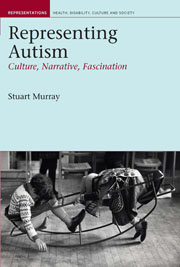Book contents
- Frontmatter
- Contents
- List of figures
- Permissions
- Preface: questions
- Introduction: autism and narrative
- 1 Presences: autistic difference
- 2 Idiots and savants
- 3 Witnessing
- 4 Boys and girls, men and women
- 5 In our time: families and sentiments
- Conclusion: causing/curing/caring
- Acknowledgements
- Select bibliography
- Index
2 - Idiots and savants
- Frontmatter
- Contents
- List of figures
- Permissions
- Preface: questions
- Introduction: autism and narrative
- 1 Presences: autistic difference
- 2 Idiots and savants
- 3 Witnessing
- 4 Boys and girls, men and women
- 5 In our time: families and sentiments
- Conclusion: causing/curing/caring
- Acknowledgements
- Select bibliography
- Index
Summary
If autism is the neurological condition of fascination of the moment, then savantism is undoubtedly the element of autism that appears most fascinating. Indeed, when seen through the contemporary lens of popular representation, autism and savantism appear to have become almost synonymous, to the point where it could be asked whether it is possible to be a savant without also having autism, or equally whether it might be supposed that all those who are autistic possess savant abilities. These questions are more cultural than neurological, and they point to the complexities surrounding the current understanding and portrayal of autism. To untangle them requires thinking and reading practices that can work through a history of medical portrayal and that are attentive to the workings of cultural narrative.
Savant skills excite in the ways in which they represent seemingly impossible capabilities and talents; they are exceptional and ‘beyond’ that which is considered normal human performance. In the popular imagination, savantism is usually associated with mathematical or memory skills – the ability to name what day any particular date fell in any given year, or to calculate the cube root of a large number, or to play a piece of music after hearing it only once – and the recent past has been full of documentaries and other media accounts of those individuals capable of performing such feats, people presented as objects of a curious interest.
- Type
- Chapter
- Information
- Representing AutismCulture, Narrative, Fascination, pp. 65 - 103Publisher: Liverpool University PressPrint publication year: 2008

